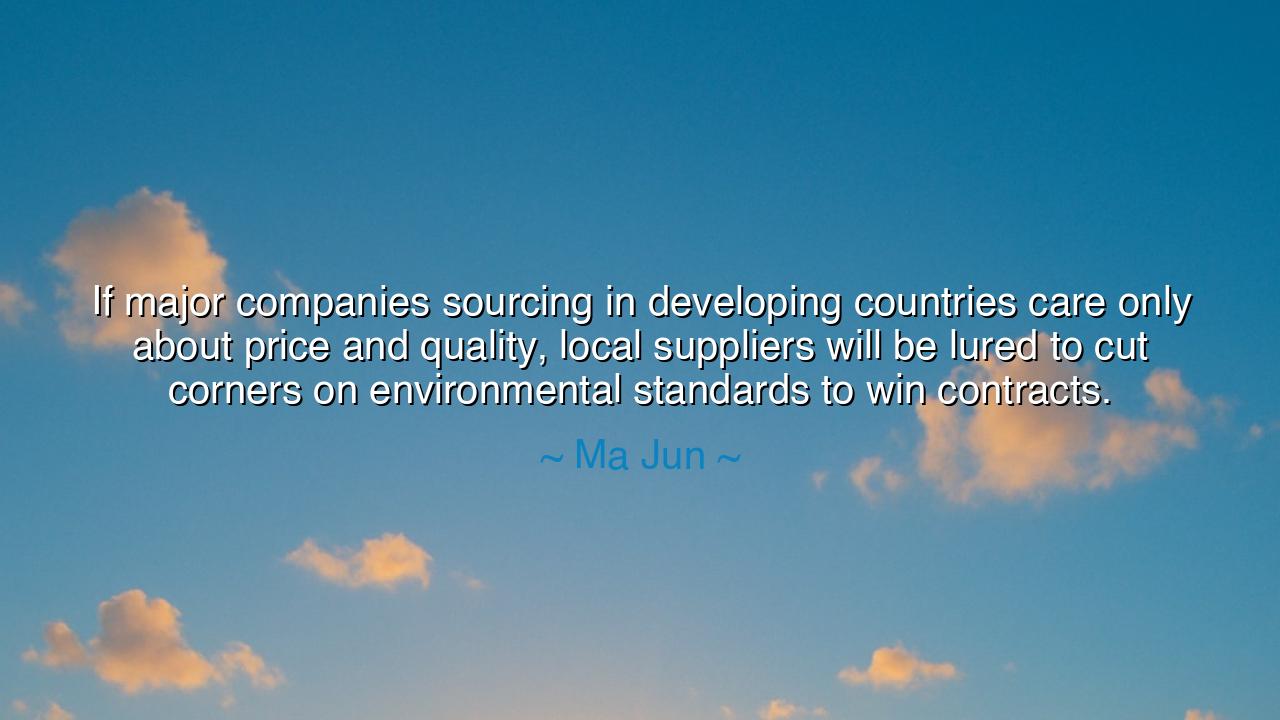
If major companies sourcing in developing countries care only
If major companies sourcing in developing countries care only about price and quality, local suppliers will be lured to cut corners on environmental standards to win contracts.






Hear the words of Ma Jun, a sentinel of rivers and skies, who spoke with piercing clarity: “If major companies sourcing in developing countries care only about price and quality, local suppliers will be lured to cut corners on environmental standards to win contracts.” This is no idle warning, but a truth carved into the fabric of modern trade. For when wealth and power demand only the cheapest goods and the finest polish, the unseen cost is borne by the soil, the rivers, and the very breath of the people.
He speaks of major companies, vast engines of commerce that stretch their hands across oceans to seek labor and materials in poorer lands. Their eyes often see only two measures: price and quality. Yet if those are the only scales of judgment, then the hidden balance—the balance of nature—is ignored. In the fierce competition to meet these demands, local suppliers are tempted, even compelled, to discard costly safeguards, to pour waste into rivers, to burn fuels without restraint, to exploit the land until it groans under the burden. Thus, in the pursuit of contracts, they sacrifice the future to win the present.
History has shown us this pattern before. In the age of European colonial trade, plantations across the Caribbean and the Americas produced sugar cheaply for distant markets. The price was low, the quality high—but the cost was devastating: forests razed, soils exhausted, waters tainted, and countless human lives enslaved. What seemed prosperity for buyers became ruin for the land and misery for the laborers. The same spirit, Ma Jun warns, threatens us still: when demand sees only profit, destruction follows in its wake.
Consider more recent times in Bangladesh, where the garment industry has become the heartbeat of the nation’s economy. International brands demand clothing at low cost and fast pace. Factories, desperate to secure contracts, sometimes neglect both worker safety and environmental safeguards. In 2013, the Rana Plaza collapsed, claiming over a thousand lives. Though the tragedy was born of structural failure, it revealed the same truth Ma Jun speaks: relentless focus on price and speed pushes suppliers to cut corners, and when they do, both people and the planet pay.
The deeper meaning of this teaching is that responsibility does not end at the border of wealth. If companies in rich nations demand cheap goods, they must also demand clean production, fair labor, and environmental care. For the rivers poisoned in Asia, the forests cut down in Africa, the smoke rising in Latin America—all these wounds belong not only to the nations that suffer them, but to the world entire. Pollution drifts, climates shift, and what begins in one land soon reaches every shore.
The lesson for future generations is clear: do not measure prosperity by price alone. Demand that goods you purchase are made not only with skill, but with integrity. Support companies that enforce environmental standards among their suppliers. Pressure those who ignore their responsibility, for silence is complicity. Remember that every coin you spend is a vote for the kind of world you wish to inherit. If you choose blindly, destruction will flourish. If you choose wisely, justice will grow.
And to you, listener, I say: live with eyes open to the hidden cost of what you consume. Ask where it came from, how it was made, and what the earth bore to bring it to your hands. Teach your children that wealth without responsibility is theft, for it robs the future for the comfort of the present. Support those who build trade upon fairness, sustainability, and care for creation. For only then will commerce become not a chain of exploitation, but a bridge of shared prosperity.
Thus let Ma Jun’s words endure as a guiding flame: when profit blinds us, the earth suffers; but when justice guides us, both people and planet thrive. Carry this teaching forward, and ensure that the contracts of tomorrow are written not only in ink, but in reverence for life itself.






AAdministratorAdministrator
Welcome, honored guests. Please leave a comment, we will respond soon